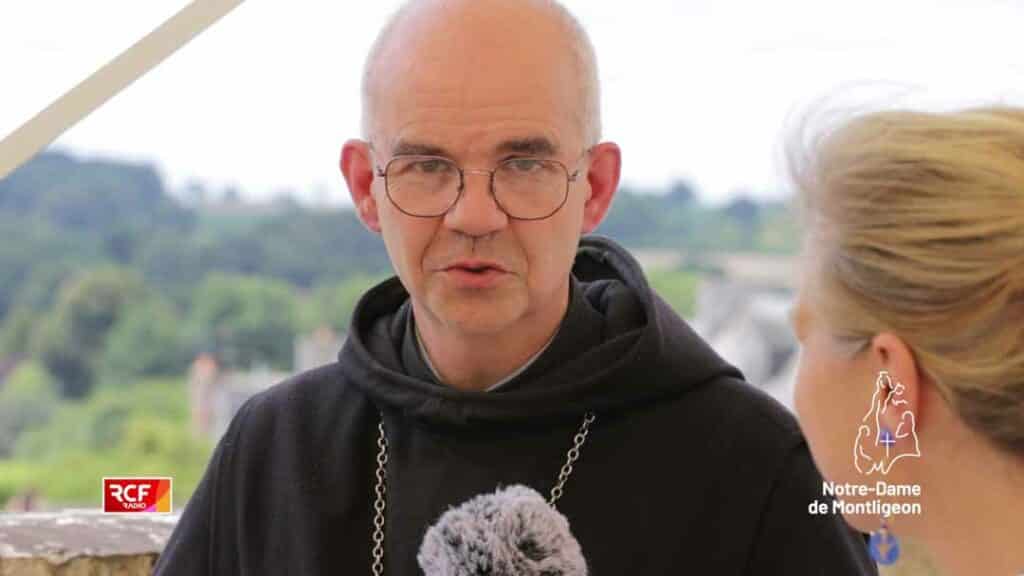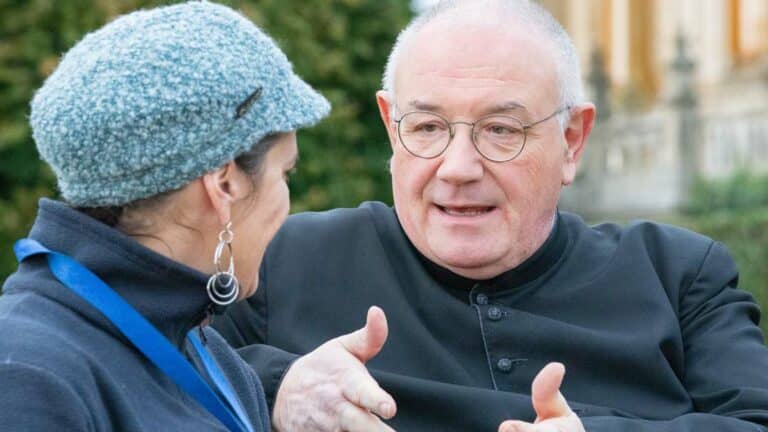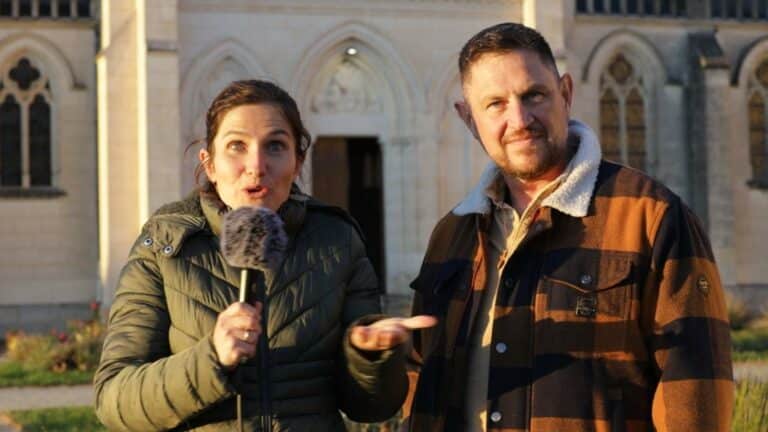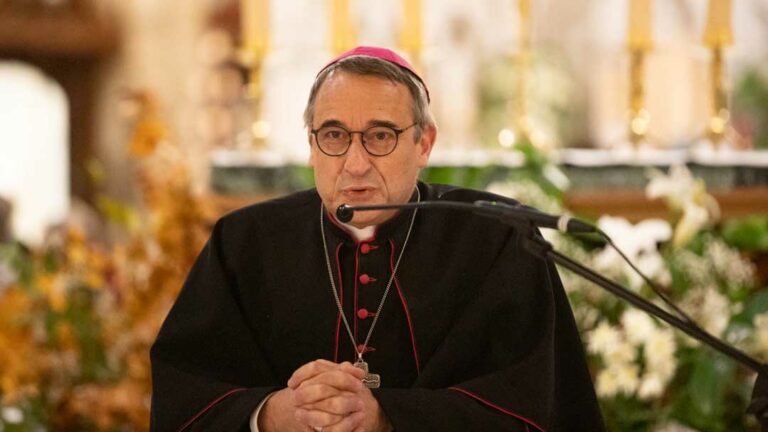Many bereaved parents whose infant died unchristened wonder about their outcome. Regardless of the cause of the death – miscarriage, abortion or stll-birth, can a child be saved if they were not christened? What is the Church’s official position on the salvation of infants who died before they had a chance to receive baptism? We asked dom Jean Pateau, the abbot at Notre-Dame de Fontgombault, who wrote Le Salut des enfants morts sans baptême* (Artège, 2017).
*[The salvation of children who died unchristened]
Why did you explore this subject?
For two different reasons. First, I was puzzled by this issue and also, the answer provided by the Church over the centuries made me feel like questionning it. Another reason is a more personal one: my sister-in-law lost a child in that same context. So I thought it would be worth reviewing the whole doctrine of the Church and find out what the answer actually was.
What does the Church have to say about the fate of those children who died without baptism?
The catechism of the Church (No 1261) is very clear about this today. We are urged to entrust those children to God’s mercy, and so does the Church. Quite often, people find this reply rather disappointing because they think, well, if we entrust our infant to God’s mercy, what does He then do? The great Dominican theologian Michel Labourdette has a very enlightening and consoling sentence: “In the terms of faith mode governing our lives, isn’t the most soothing ‘certainty’ to put oneself in God’s hands [1]?” Admittedly, we have no certainty that those children are saved, since the Church doesn’t teach this toda. However, there is a broad consensus that they are saved. Which is also my belief.
[1]. M. Labourdette, « Problèmes d’eschatologie », in Revue Thomiste, 1954, p. 664.
What is your opinion about the limbo theory?
The limbo theory (from the Latin word limbus, meaning fringe, border) was the answer given by theologians to the question of the fate of children who had died unchristened. Limbo is the place where these children were supposed to be. Given that they would bear the marks of the original sin from their mother’s womb, they are deprived of God’s grace (Romans 5:12). This deprivation of grace means that they cannot achieve heavenly bliss without God’s intervention, in order to reconcile them with him. The usual path to this reconciliation is baptism. However, for these children, baptism did not or could not take place.
Responding to Pelagius’ position that we could obtain salvation by ourselves, Saint Augustine strongly reasserted the need to receive the sacrament of baptism. In such conditions, those children cannot reach blessing and communion with the Lord. Saint Augustine therefore suggested that there could be a place at the border of hell where they would undergo small sensitive sufferings. Over the centuries, theologians developed this theory and, as a result, the limbo moved to another place! Those infants were removed from hell and sensitive punishment was taken out from them. In the end, children were considered as deprived from God’s vision whilst still experiencing a huge natural happiness. They can think, they are happy but they do not see God.
How can you be happy without seeing God?
Per se, the ability to see God is not part of our human nature. It is a free gift from God. However, for a being to be deprived of such blissful vision even though they are meant to enjoy it, as well as their inability to meet their parents, are both hardly consistent with perfect joy. Those children are complete philosophers in fact. They understand that they have parents while at the same time being unable to meet with them. With so many challenges, the theory of limbo is not satisfying.
Can baptism of desire replace sacramental baptism?
A distinction must be made between the desire for baptism and what theologians call “baptism of desire”. “Baptism of desire” reconciles the person with God, uniting him or her with Christ and the Church. In a catechumen, even in a person who wishes to begin the process of receiving the sacrament, God makes the desire for baptism effective. He grants the person the grace of reconciliation. This is what we call “baptism of desire”.
However, the baptism of desire only applies to oneself, and infants cannot desire it. Desiring baptism for others, on the other hand, is an invitation to intercede with God. Parents who lose their child, whether through abortion after realizing their fault and requesting forgiveness, or through miscarriage, are in the best position to ask the Lord to welcome their child into God’s presence. The common priesthood of the faithful makes us responsible for one another, and calls us to intercede for the salvation of all. God wants all men to be saved, and it is our duty to want this and to ask for it.
What in the specific case of an abortion?
Sometimes, in modern medical protocols, a decision to proceed with an abortion may be taken very quickly, with the woman becoming aware of the gravity of her action only much later – for instance when she gives birth to other children. She realizes that what took place in her womb was not nice. In French, we have the word “enceinte” for “pregnant”. It also means “fortress” or “protected place”, something that strikes me. This bears a terrible incoherence: abortion is an injury to this sanctum, which is protected by nature. Hence, a realization, alongside an overwhelming feeling of guilt, may arise years later.
Of course, she may ask to be forgiven and receive the sacrament of penance; however, this will not make the child come back. Hence the overwhelming question that torments a mother: “How does my child regard me?” If the child is in Heaven, they can but cast a gaze of mercy over their parents. They intercede for those who allowed them to access heavenly bliss. Heaven is not a place of rancor or where scores are settled, it is a place of peace. The child’s greatest desire is that their mother, father, brothers and sisters be next to them. This is a certainty.
In the vision of God, the child walks the conversion path of their mother. By the way, in his first draft of Evangelicum vitae (1995), John-Paul II raised the issue, saying to women who had undergone abortion: “You realize that nothing is lost and you can request forgiveness from your child who now lives in the Lord” (No 99). Since then, the text was reviewed to meet the teachings of the Catholic Church and now reads: “To the same Father and his mercy you can with sure hope entrust your child.”
Infants who die before birth or before the age of reason have no ability to act out of their own will. Does this hinder their salvation?
That’s right, small children cannot act of their own will. Saint Paul however makes it clear that “God wants all men to be saved” (1 Tm 2, 1-4). Likewise, in Gaudium et Spes No 22, Vatican II teaches that God offers all men and women a means to be saved. We may consider therefore that God’s universal will for salvation can be fulfilled, not only when an act of will from man occurs but also when the person does not hinder this divine will. The person in a way is open to grace and that’s how God’s salvific will is fulfilled.
The Church has not established salvation for those children. Nevertheless, some verses in the scriptures suggest that such an interpretation does make sense. For instance, “Let the little children come to me, and do not hinder them, for the kingdom of God belongs to such as these.” (Mc 10,14), or “Can a mother forget the baby at her breast and have no compassion on the child she has borne? Though she may forget, I will not forget you!” (Is 49,15).
Could such hope make baptism optional for small children then?
This broad consensus that unchristened children are saved should not lead to considering baptism as unimportant. There is really a risk there. Parents should request baptism for their child. By not doing so they seriously fail to fulfill their responsibility as Christian parents.
What advice do you have for families who lost an unborn child and are unable to bury them?
I would recommend that they give a name to the child, because it is a person to whom they can talk. In my family, there is a little Cecile, who is near God. Parents can also have masses celebrated and pray. In the conclusion of my book, I recommend to develop prayer for children who died without receiving baptism, alongside the Œuvre de Montligeon, which intercedes for the souls in Purgatory. In the Basilica actually, there is a special place for those children, namely the Chapel of Deceased Infants. Feeling that they can get support on the way is important for mothers, especially for women who underwent an abortion and need words of consolation.
Why pray for children who have died without baptism, since they are presumably saved?
God’s mercy is real but the Lord may – and even wants – to link the performance of His mercy to prayers. Whilst we like doing things on our own, the Lord gets human beings to largely participate to His path of salvation in particular, and to the progression of their brothers and sisters towards salvation. Besides, it will be a grace in eternity to see how the prayers of each one will have helped on our path to eternity.
Praying for a deceased person may seem pointless if that person is already in Heaven. Who knows if our prayers haven’t helped them on their way? So we have a duty to pray for these children, even if God has already granted them His grace. Plus, there are so many more children who will be in this situation. By doing so we get involved in God’s work.
This prayer also helps us grow in holiness. And when we do, Heaven is closer.




